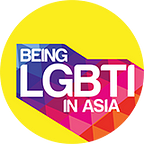Lack of legal gender recognition exacerbating stigma, discrimination and exclusion in Asia
7 December 2017
Phnom Penh — A lack of legal recognition of gender identity is exacerbating the stigma, discrimination and exclusion that transgender people in Asia are experiencing, participants heard at a panel session at the ILGA Asia Conference.
The session was organized by the United Nations Development Programme (UNDP) and featured key findings from the joint UNDP and Asia Pacific Transgender Network (APTN) study Legal Gender Recognition: A Multi-Country Legal and Policy Review in Asia.
The multi-country study undertook a comprehensive review of existing laws, policies and practices related to legal gender recognition for transgender people in the following countries: Bangladesh, China, India, Nepal, Pakistan, Philippines and Thailand.
“Throughout much of the world, transgender people experience daily stigma, prejudice, discrimination, harassment and abuse,” said Zainab Patel, Policy Analyst, UNDP Bangkok Regional Hub. “In many places they live in fear of transphobic violence. This can lead to poor emotional health and well-being, and drive transgender people towards the margins of their communities, and into situations and behaviour patterns, including sex work, that put them at risk.”
The violations experienced by transgender people are broad-ranging and varied, from laws against cross-dressing, to denial of health care, to discrimination in employment and housing.
“Gender recognition, in documents and in law, is important for transgender people. Without such recognition, it is difficult or impossible for trans people to enjoy the rights and opportunities available to other people in one’s society,” said Zhan Chiam, Gender Identity and Expression, Senior Programme Officer, ILGA.
Gender recognition laws, and the rights and health issues surrounding them, are currently a matter for public debate across much of the world. Lack of legal gender recognition is a key barrier that often prevents trans people from exercising their rights related to marriage with a person of their desired gender, child adoption, inheritance, wills and trusts, employment, access to public and private health services, and access to and use of social welfare and health insurance schemes,” said Mitch Yusof, APTN Regional Steering Committee Co-chair.
The report found that progress has been made in the provision of legal gender recognition in many of the countries reviewed. Bangladesh, India, Nepal and Pakistan recognize a third gender on specific government-issued documents. Of the countries reviewed, only China provides a clear administrative process for transgender people to change gender markers on official identity documents from male to female or vice versa. The process, however, is subject to restrictive eligibility criteria.
Among the reviewed countries in which gender recognition has not been formalized, progress has been made in other areas. For instance, in 2015, Thailand’s Gender Equality Act specifically included transgender people under the definition of ‘gender’ and as protected from unfair gender discrimination. In the Philippines, gender identity is included as a protected ground in some local anti-discrimination ordinances.
Despite positive policy developments in some countries, the report illustrates that eligibility criteria or other restrictions set out in laws, policies, regulations or court decisions, or imposed through administrative practices, effectively exclude many transgender people from obtaining government identification documents which reflect their gender identity.
One of the main points of the discussion was that any litigation strategy for legal gender recognition must envision these rights within a larger trans movement — one which places similar emphasis on sensitization of medical service providers, the criminal justice system and other stakeholders.
“It is important that there be a wider campaign around trans rights to ensure that any legal change percolates down to the grassroots,” said Wannapong (Nhuun) Yodmuang, Advocacy and Human Rights Management Officer, Rainbow Sky Association of Thailand.
It was also noted that the Yogyakarta Principles highlight legal recognition before the law based on one’s self-defined identity as a fundamental right. The Principles highlight that everyone has the right to recognition everywhere as a person before the law, and that persons of diverse sexual orientations and gender identities should enjoy legal capacity in all aspects of life. Each person’s self-defined sexual orientation and gender identity is integral to their personality and is one of the most basic aspects of self-determination, dignity and freedom.
LGBTI activists, experts and scholars working on sexual orientation and gender identity issues from up to 35 countries and territories gathered at the 7th ILGA Asia Regional Conference 2017 from 6–9 December to openly and frankly discuss the lived realities of LGBTI people, and to take stock of the many groundbreaking moments celebrated by communities in the past few years. The conference was organized in Phnom Penh by Rainbow Community Kampuchea (RoCK), a member of ILGA Asia. For more information visit https://ilgaasia2017.com/.
